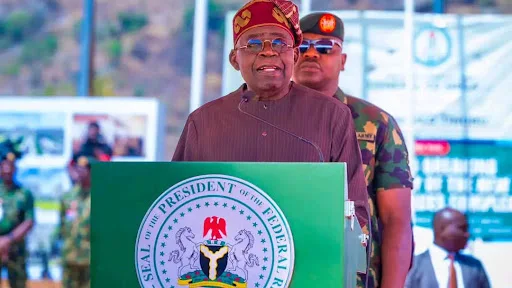As Nigeria inches closer to the 2027 presidential election, the political landscape is already heating up with discussions about potential challengers to President Bola Ahmed Tinubu. However, when the dust of speculation settles, one fundamental question remains: is there truly an alternative to Tinubu for the North?
The options before Nigerians—Atiku Abubakar, Peter Obi, and Goodluck Jonathan—are a trio of failed politicians whose track records do not inspire confidence. From economic mismanagement to blatant disregard for national unity, these figures represent everything Nigeria must move past.
Atiku Abubakar: A Perennial Candidate With No Legacy
Atiku Abubakar has built a career out of running for president, yet his actual contribution to the North and Nigeria at large remains a phantom dream. He has contested for the presidency six times and lost in all of them, yet he persists, much like an aging gambler who refuses to accept reality.
Despite holding the powerful position of Vice President from 1999 to 2007, what exactly did Atiku do for Northern Nigeria? The North remains economically stagnant, with millions of young people unemployed and infrastructure in ruins. Atiku, a man who boasts of his business acumen, failed to use his influence to industrialize the region. Where are the factories? Where are the agricultural reforms?
Even his much-hyped private investments, such as the American University of Nigeria (AUN) in Yola, are nothing but a vanity project that serves only the elite. Unlike President Tinubu, whose administration has embarked on the “Back to Farm” initiative to boost agriculture and food security, Atiku left the North to fend for itself while focusing on personal business interests.
Atiku’s Political Betrayals and Inconsistencies
Atiku's political career is one long list of betrayals and inconsistencies. He has switched political parties more than any other politician in Nigeria’s history, from PDP to ACN, back to PDP, then to APC, and again to PDP. How can Nigerians trust a man who does not even trust himself?
In the 2023 election, Atiku’s inability to unite the PDP led to a disastrous campaign. The G5 Governors, led by Nyesom Wike, abandoned him, and even within the North, he could not consolidate support. If a man cannot keep his house in order, how can he manage an entire nation?
One of the biggest criticisms of Atiku is his perceived indifference to the struggles of ordinary Northerners. Unlike Tinubu, who has appointed key Northerners to high-ranking positions, Atiku has never been known to uplift his people beyond political rhetoric.
Peter Obi: A Man on a Religious War Against the North
If Atiku is a failure, Peter Obi is a dangerous demagogue whose presidential ambition is built on tribal and religious extremism. Obi’s 2023 campaign exposed his deep-seated disdain for the North. His campaign structure was over 90% Igbo, a clear indication that he was not running as a Nigerian candidate but as an ethnic and religious champion.
During the elections, Obi's rhetoric was laced with anti-North sentiments. His infamous “Yes Daddy” phone call with Bishop David Oyedepo, where he begged for support in a "religious war", further confirmed his agenda. Northern Nigeria, which values unity and religious tolerance, will never accept a candidate who seeks to divide the nation along ethnic and religious lines.
Unlike President Tinubu, who has ensured regional and religious balance in governance, Obi’s approach to leadership is exclusionary and divisive. This is why he failed to secure the widespread support needed to win a national election.
Goodluck Jonathan: A Symbol of Corruption and Incompetence
Many Nigerians may have forgotten, but history will never erase the catastrophic legacy of Goodluck Jonathan’s presidency (2010-2015). His administration was arguably the most corrupt in Nigeria’s history. Under his watch, billions of dollars were looted, and the economy was crippled by reckless mismanagement.
Jonathan’s most damning failure, however, was his weak leadership in tackling Boko Haram. His refusal to act decisively against the insurgents allowed them to flourish. The 2014 Chibok girls’ abduction was a defining moment of his incompetence. Instead of taking immediate action, his government dismissed the kidnapping as a hoax until international pressure forced him to acknowledge the tragedy.
Even his own party members, such as former President Olusegun Obasanjo, publicly condemned him. Obasanjo, in his book My Watch, described Jonathan as “a weak and clueless leader who surrounded himself with corrupt advisers.”
In contrast, President Tinubu has prioritized security and national stability. His administration has strengthened the military, launched coordinated offensives against bandits, and ensured that security forces are better equipped to fight insurgents.
Why Tinubu Remains the Best Option for 2027
While Tinubu’s administration has faced challenges, his approach to governance is result-oriented and pragmatic. Unlike his challengers, he has demonstrated a clear economic vision, focusing on:
Agricultural revolution through the Back to Farm Initiative
Infrastructure expansion, particularly in road and rail development
Security enhancement, with the procurement of modern military hardware
Economic reforms, which, although painful in the short term, are necessary for long-term stability
In just over a year in office, Tinubu has laid the foundation for economic recovery. The removal of the fuel subsidy, while unpopular, was necessary to end decades of economic sabotage. His administration has rolled out palliatives, wage increases, and social intervention programs to cushion the impact on the poor.
The Verdict: Tinubu or a Return to the Dark Days?
Nigerians must choose wisely in 2027. The options are clear:
A return to Atiku’s empty promises and self-serving ambitions
An endorsement of Peter Obi’s tribal and religious agenda
A repeat of Jonathan’s era of corruption and incompetence
Or continuity with President Tinubu, who, despite challenges, is focused on rebuilding Nigeria
The 2027 election is not just another political contest; it is a battle for the future of Nigeria and the North. If Nigerians desire stability, progress, and economic transformation, Tinubu remains the only viable option.
Tags
Corridors of Power

